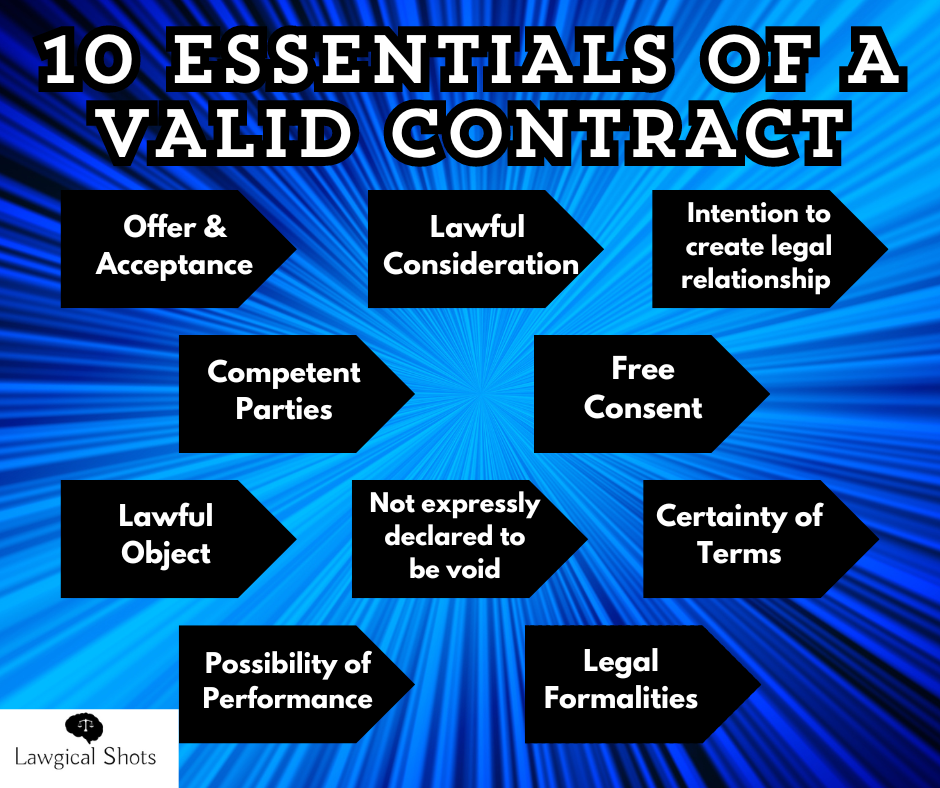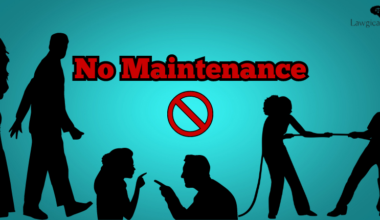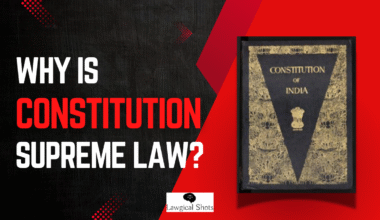My brother and I entered a contract that he will take care of making tea everyday, and I will be making his favourite food for a meal on a daily basis. So if he refuses to make tea one day, can I sue him? There was an agreement and there is a consideration as well. So isn’t it a valid contract? On that note, what are the essential elements of a valid contract? Let us dive deeper into the context. But first, let’s get to the basics, definition of a contract, to be specific.
What is a Contract?
In real life, we use the term ‘contract’ in a very casual manner. However, there are some prerequisites for an agreement to be termed as a contract. Section 2(h) of the Indian Contract Act, 1872 defines contract. It states that “An agreement enforceable by law is a contract”. The requirements of an agreement is an offer and its acceptance in exchange of a certain consideration. Acceptance of an offer for a certain consideration, to commit an illegal act, is not a contract but a mere agreement, which is void for being not enforceable under law.
Here, let’s get back to the relevant topic, that is the essentials of a contract which is valid.
10 Essential Elements of a Valid Contract with Examples

1. Offer and Acceptance
A proposal or an offer is made when a person expresses his/her willingness to do or abstain from doing something, seeking assent of the other for the same. When the person to whom such a proposal or offer is made, reflects his/her acceptance to the offer, it becomes a promise, which is combined with certain consideration to form an agreement. As discussed above, not all agreements are contracts, but an agreement is one of the essential elements of a valid contract.
Example – Ram proposed to make a cup of tea for Shyam, who in turn quickly accepted the offer.
2. Lawful Consideration
Any agreement for which the consideration so paid is unlawful is categorised as void. Hence, the consideration paid in pursuance of the agreement should not be forbidden by law, should not be of the nature to defeat any provisions of law, not be fraudulent, should not involve injury to any person/property, and should not be opposed to public policy.
Example – Ram made a cup of tea for Shyam and asked him to pay Rs 20.
3. Intention to create legal relationship
The parties to the agreement should be intending to establish a legal relationship and not involve each other in a casual manner.
Example – Ram and Shyam did not engage in a friendly conversation over a cup of tea. Ram was a Tea Business Owner while Shyam came to be his customer. On the contrary, if it was a friendly banter between friends to make a cup of tea in exchange of something, it would not be considered to reflect the intention to create a legal relationship.
4. Competent Parties
When we discuss competent parties, it means the one who made the offer and the other one who accepted the same had the capacity to do so in a legal sense. Section 11 of Contract Act defines persons ‘who are competent to contract’. It requires a person to be of the age of majority as per the applicable law, a person of sound mind, who is not disqualified from contracting by a specific law.
Example – For it to be a legal contract, Ram and Shyam can be considered to be adults who were competent to enter a contract. Minors are not competent to contract. So had Ram or Shyam been a person below the age of 18 years, the contract would have turned invalid.
Also read Constitutional Law Topic – Governor – Executive Head of the State
5. Free Consent
As the term suggests, the parties should freely consent to enter the agreement, agree for the same thing in the same sense. Section 14 of the 1872 Act defines consent to be free when it is not caused by coercion, undue influence, fraud, misrepresentation and mistake of fact or law. If any one of the elements is proved in a challenge against the contract in question, there was no free consent and the contract in question becomes void.
Example – If Ram refused to make a cup of tea for Shyam, and Shyam brings Ram’s father to insist Ram to make tea for him, it would not be free consent but the father’s undue influence that caused Ram to agree. Thus, it would not be considered a valid contract.
6. Lawful Object
The aim for which the parties enter the agreement should be lawful for the contract to be valid. In other words, the object would be unlawful if it is forbidden by law, is on nature that it would defeat the provisions of any law if permitted, is fraudulent, involves injury to a person/property, the Court regards it immoral, or is opposed to public policy as per Section 23 of 1872 Act. In case any one of these is linked to the object of contract in question, the same begets unlawful object and becomes void.
Example – If Shyam comes to Ram to make a cup of tea and asks him to add some intoxicating banned drugs in the tea, the contract would become invalid. The reason being that selling and buying a cup of tea would be lawful, but the object of intoxication of that tea would make it unlawful.
7. Not expressly declared to be void
The Indian Contract Act, 1872 declares a contract void under Sections 24 to 30. The circumstances when a contract is void include –
- If any part of the considerations and objects are unlawful
- If there was no consideration unless it was written and registered or there is a promise to compensate or there is a promise to pay a debt barred by the Limitation Act.
- If the agreement restrains marriage
- If the agreement restrains a trade
- If the agreement restrains legal proceedings
- If the agreement is uncertain
- If the agreement is made by way of wager
Example – If Ram and Shyam bet over a 100 cups of tea if it rained the same day, it would be wagering and thus, the contract would turn invalid for being illegal. Similarly, any act which is expressly forbidden by law and the parties include some aspect of that prohibited act in their contract, it becomes void.
8. Certainty of Terms
The terms on which the contract in question is based should be very clear and concise, and not be rooted in uncertainties. If there are doubts on the interpretation of terms included in the agreement between the parties, such a contract becomes invalid.
Example – Shyam asked Ram to deliver tea to his office on a daily basis and Ram agreed. However, Shyam did not disclose any information on the number of cups or the number of times for delivering tea on a daily basis. Thus, there was no certainty in the terms of contract, making it invalid.
Also read Torts Law Topic – A Duel Between Strict and Absolute Liability
9. Possibility of Performance
If the object of the contract is something which is next to impossible at the time of performance, such a fact makes the contract invalid. The reason being that a contract impossible to be performed cannot be enforced as per the 1872 Act.
Example – If Shyam tells Ram to deliver 1000 cups of tea to his office, while Ram lacks such resources to make a huge quantity of tea at such a short notice, it would turn the contract as impossible to perform.
10. Legal Formalities
Not all, but there are certain contracts which should be in written form. There are other contracts which require to be registered and have a witness as well. In fact, the contract should involve legal activities at all stages, or it may not be enforceable.
Example – In case Ram and Shyam are involved in a tender for higher quantity of tea for a longer run for their office, they should reduce their terms in a written contract so that both the parties remain at peace.
Conclusion
With the aforementioned essential elements of a valid contract with examples, it is an attempt to make the picture crystal clear for the readers. A contract is important in day-to-day life. If there is an invalid contract which the parties ignore, it may land one of the parties in trouble if a dispute arises. Thus, being aware of the essentials of a valid contract is the ultimate key to safeguarding the interests of the parties.








